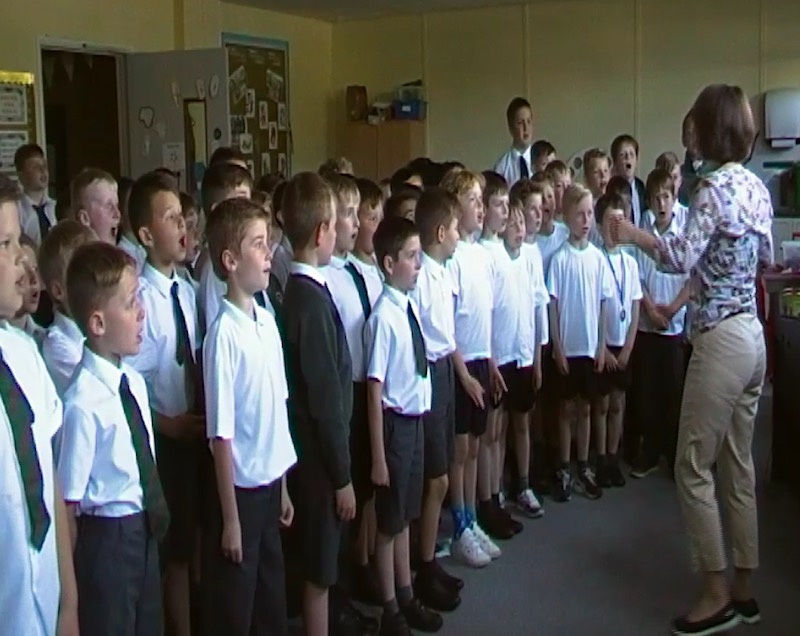This case presents how a music teacher has developed singing in her primary school.
nurturing and developing quality singing across the school and beyond
What are the goals of the work?
The goal of this case study is to look at how singing can be successfully developed across a school, both in the curriculum and in extra-curricular clubs.
Music is reported to be very important to everyone at Montpelier. It drives the school. A visitor from the local teaching school alliance recently commented ‘You can almost smell the music when you go into the school!’ Singing together forms a key part of the school’s ethos, as illustrated in the published school creed written by the school council.

The case study looks at curriculum singing and how this is furthered in extra curricular singing clubs.
How does it fit into the learning strategy of the school/setting?
The school seeks to provide a broad and balanced curriculum where singing plays a key role in learning across the curriculum, such as in mathematics, language (phonics) and topic work.
How does it fit into the curriculum of the school/setting?
Each Key Stage 1 and Key Stage 2 class receive one hour of music each week that is taught by a music specialist.
What outcomes are being explicitly targeted?
Montpelier aims to be singing school where everyone enjoys, achieves and progresses to the next step on their singing journey.
What is the context of the work?
Setting
- Montpelier is a Primary School with an urban catchment that converted to part of a Multi Academy Trust in April 2016
- Age range of students is 4-11 years.
- No of students on role is 668.
- Does the example fit into longer term plan or is it ‘stand-alone’? : Singing is designed to be an element of the ongoing curriculum for music throughout the school.
- Who is leading the work : Jessica Rowe, specialist music teacher for the school.
What is the content of the work?
Regular singing activities form part of weekly lessons for all year groups. There are also other opportunities for developing skills in singing and singing engagement. The choirs including a Transition Choir for pupils who have moved to local secondary schools to provide them with a continued singing opportunity.
The focus of the case study is on the different ways that engagement with and development of good quality singing is developed throughout the school (and beyond).
- The performance of singing repertoire focuses on intonation, dynamics, phrasing, expression, and fluency, seeking to improve the quality of what pupils naturally produce.
Foci include the promotion of:
- enjoyment, enthusiasm and interest;
- mood regulation and enhanced well-being, both physical and psychological; and
- moral and spiritual development.
- individual and group singing activities (solo, duo, small-group, ensemble);
- a sense of performing and communication with an audience;
- interpersonal skills and positive relationships with others; and
- a sense of positive teamwork and co-operation.
What are the key features of the teaching and learning approach?
leading
Although a specialist musician, the teacher is not a singing specialist as such. Nevertheless, she uses her professional knowledge and musicianship, as well as CPD experience, to inform her overall pedagogical approach to singing.
Singing is important because of the collective joy that it can bring. Singing can be accessed by everyone, no matter of ability. It is a form of artistic expression. It is something that we all do. It can bring together groups of people from all different walks of life and provide a sense of escape for those who need it. It can bring joy to the most emotional of times and provoke memories of treasured moments. Schools should embrace the joy that singing can bring and in my opinion would be better places as a result.
This particular case is suggested for inclusion under the ‘inspire-music’ umbrella because it provides a useful example that illustrates how a specialist may become successful in an area in which they do not feel especially expert, thus potentially addressing a generalist teacher’s concerns about how expert a musician you need to be to promote singing in a class/school.
The teacher seeks to ensure that there is
- Secure provision for technical, musical, social, personal and critical aspects;
- Materials and resources that match developmental phase/age/of learners;
- Appropriate preparation to meet the requirements and aspirations of learners;
- Fluency and energy that give appropriate pace; and underpinned by a
- Positive and professional ethos, that is responsive to individuals and groups
How is the work being reviewed?
Success is measured by observation and feedback from pupils and colleagues. This includes evidence of
- A positive response to new materials and resources, and to the successful consolidation of familiar work;
- Expectations of the music leader being clear to all participants; and
- No evidence of barriers to participation
Singing is important because of the sheer enjoyment pupils’ gain from partaking in and performing both individually and as part of a group and/or choir. It also greatly helps to develop self-confidence, co-operation and teamwork. To experience a choir working together in harmony to produce a rich and entertaining sound is both a delight to see happening and also, of course, to hear. Pupils always seem to achieve a strong sense of satisfaction and accomplishment from being a part of this and it enables all those who are interested, regardless of academic achievement or sporting prowess, to be a part of something special.
What are the key features of teacher/leader behaviour that are enabling those positive outcomes?
The teacher seeks to demonstrate enthusiasm, to design activities that are well-paced and well-structured with suitably engaging and challenging repertoire. There is an attention to technical development in singing as well as expressive communication.
What are the key features of context, content and activities that are enabling those positive outcomes?
The teacher has a supportive senior management, colleagues, parents and governors. She has worked at the school for many years as a class teacher, as well as a specialist music teacher, and so she is well-known and respected within the school community. She is also well-connected to the professional music teaching community and works for the Plymouth Music Education Hub one day a week. This enables her to keep up-to-date with current practices and priorities in Music education.
She is not a trained singer, but someone who loves singing and the sense of community that it fosters. The methods that she uses can be easily replicated or adapted by specialists and generalists alike.
